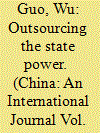| Srl | Item |
| 1 |
ID:
155933


|
|
|
|
|
| Summary/Abstract |
This article reconstructs the origins, typology and implications of extrajudicial incarceration as a political phenomenon during the Cultural Revolution. It analyses the “cowshed” based on its various founders and functions at different stages of the Cultural Revolution, and argues that the Party committees, the People’s Liberation Army (PLA) and the revolutionary committees, i.e. the arms of the state, played a role no less significant than student Red Guards in confining and torturing innocent people. The article emphasises that the cowshed was distinct for its pervasive, decentred, arbitrary and spontaneous characteristics; however, the exertion of direct popular justice without formal intermediation in China was an alternative form of state violence through outsourcing the state power.
|
|
|
|
|
|
|
|
|
|
|
|
|
|
|
|
| 2 |
ID:
172254


|
|
|
|
|
| Summary/Abstract |
Putting the cultural experiences of a multitude of prisoners during the Cultural Revolution in the historical context of the modern Chinese prison system and in light of the critical theories of methods of penalty and cultural production under incarceration in modern society, this article argues that the formal prison and informal cowshed during the Cultural Revolution both served as important sites for cultural production and dissemination. They also demonstrated the inmates’ perseverance, articulation and resistance. Beneath the surface of highly structured and formulaic daily routine, mechanic ritual performance and forced obeisance, the political prisoners utilized multiple available forms to negotiate with the authorities, influence each other and even their guards, and maximize the freedom of reading, communication and gaining outside information.
|
|
|
|
|
|
|
|
|
|
|
|
|
|
|
|